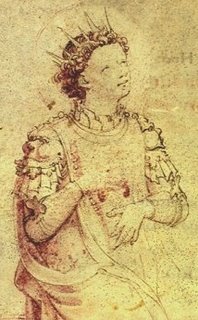Isaiah 2:2-3 (NRSV)
"In days to come the mountain of the Lord's house shall be established as the highest of the mountains, and shall be raised above the hills; all the nations shall stream to it. Many peoples shall come and say, 'Come, let us go up to the mountain of the LORD, to the house of the God of Jacob; that he may teach us his ways and that we may walk in his paths.' For out of Zion shall go forth instruction, and the word of the LORD from Jerusalem."
I've been thinking today about what "Zion" and "the mountain of the Lord's house" means to us Christians in the West, at the close of 2007. It's not my intention to get into all the possible details of the historical context of Isaiah's message concerning Judah and Jerusalem, but simply to outline a few thoughts about how that message intersects with where and how we live now as Christians.
First of all, if we consider the actual city of Jerusalem, it 's interesting that nations do stream to Jerusalem. Peoples of three different world-wide faiths claim Jerusalem as a (or the) capital of their historic faith. Unfortunately, this has resulted in fierce contention for occupation of it. This is sadly ironic, considering the prophecy of verse 4 which follows. Some people come to the earthly, physical Jerusalem today to pray, some to see the sights, and some to learn. Some come, and even stay, to foment further discord among the very uneasy truce that often holds there. But when we think of Jerusalem, we don't see it as the supreme center of learning from the Lord that Isaiah prophesied it would be. It's simply an interesting, old, important, but mainly violent place that most people never visit.
So I began to wonder, what are the "jerusalems" of the world?
- For "what happens there, stays there" naughtiness, we have Las Vegas.
- For fashion and style, we have Paris and Milan.
- For celebrity and conspicuous consumption, we have Los Angeles.
- For the hub of world commerce and finance, we have New York and Tokyo.
- For history and tradition (with a fair bit of funkiness in the mix), we have London.
- For more history and tradition, especially religious-style, we have Rome.
There are many, many more "centers" and I'm certain my list could be improved. What I could not really come up with, however, was a modern-day equivalent of Isaiah's visionary city of God's own instruction. We have no one place where all the world knows they can go to learn from God.
What this tells me is that we have to settle for smaller, more intimate "centers" of godly learning. We grafted branches -- Christians -- have received precious instruction from God. According to Jesus the Christ, we are to "teach [all nations] to obey all that [Christ has] commanded [us]." When we've been taught, we're expected to teach others. (As with anything, learning that is hoarded and kept to oneself quickly becomes ingrown and does no one else any good.)
I believe that our churches, our communities of worship, learning, and service, are supposed to be "little jerusalems" to the world. We should be living, 24-7 examples of the teaching of God, reflecting the richness of God's wisdom and practicing the grace by which we have been saved.
As Advent begins, I hope to be that kind of beacon toward God for those who are dying for what only God can provide. I pray that I may be a channel through which God can work to draw others to the divine heart. The first candle is lit. I pray that I, too, may shine brightly for Christ.

No comments:
Post a Comment